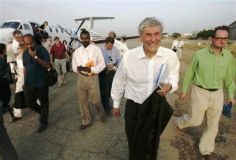UN refugee chief proposes autonomy for Darfur; Sudan says it’s willing to talk
By ELLEN KNICKMEYER, Associated Press Writer
ABECHE, Chad, Sep 24, 2004 (AP) — The U.N. High Commissioner for Refugees proposed autonomy for the troubled Darfur region of Sudan, an extreme measure Sudan has resisted but said Friday it would be willing to talk over under international pressure to end violence that has claimed tens of thousands of lives.
 U.N. refugee chief Ruud Lubbers also declared that “most” of an alleged government-backed campaign of ethnic cleansing in Darfur appeared over, and refugee workers said the flow of refugees had eased markedly.
U.N. refugee chief Ruud Lubbers also declared that “most” of an alleged government-backed campaign of ethnic cleansing in Darfur appeared over, and refugee workers said the flow of refugees had eased markedly.
But Lubbers said during a visit to Chad, whose eastern territory borders Darfur, that it would take time for the Sudanese region’s frightened people to work up the courage to go home.
In Kenya, the U.S. State Department’s representative for Sudan said it would take up to two years to disarm the Arab militia accused of carrying out the bloodletting, and secure the homecoming of the 1.4 million civilians who have fled Darfur.
Lubbers, opening a five-day mission on the Darfur crisis, went farther than any international official has done previously in proposed resolutions to end violence that has killed more than 50,000 of Darfur’s people.
“There has to be some clear partition of power in Darfur,” Lubbers said.
He said he meant not “the total giving away of Darfur” by Sudan’s central government, but “a limited amount of autonomy within the framework of the territorial integrity” of Sudan, Africa’s largest country.
Nothing less than that kind of radical change would ensure violence between Darfur’s non-Arab villagers and Sudan’s Arab-dominated central government was truly over, the refugee chief said.
“One thing is to end the violence, another thing is to start peace,” said Lubbers, known for outspokenness going to what he sees as the root of refugee crises.
“There cannot only be a temporary … cease-fire because then it (fighting) can break out again,” Lubbers said, speaking at a border-area town that is the U.N. base for camps holding most of the 200,000 Darfur refugees in Chad.
“We have an enormous responsibility now, not to accept that this can go on and on.”
The government in Khartoum has denied widespread allegations that its troops and allied Arab militia, called the Janjaweed, have carried out what the United States calls genocidal attacks against Darfur’s non-Arab African population.
The crackdown followed a February 2003 uprising by the Sudan Liberation Army and the Justice and Equity rebel movements.
Leaders in Khartoum previously have refused the degree of autonomy demanded by the two Darfur rebel groups.
However, a senior Sudanese official said Friday the government was open to talks on Lubbers’ proposal.
“What do they mean by an autonomous region? This is something to be discussed,” Sudan’s state minister for humanitarian affairs, Mohammed Youssef Abdullah, said in a telephone interview with The Associated Press in Cairo, Egypt.
Lubbers, making his second visit in a series of missions by international leaders to Darfur as world attention grew, spoke of the months of “ethnic cleansing of villages. Most of this appears to be behind us … but it doesn’t end 100 percent completely.”
It was too early to judge whether the Sudanese government had met commitments including reining in the Janjaweed, he said.
Unlike other U.N. officials, the refugee chief said no foreign troops were necessary, only monitors to watch for any full-scale return to attacks.
U.N. officials here said the number of refugees crossing over into Chad had fallen into the hundreds each week, after averaging more than 1,000 a day at times earlier in the year.
Last weekend, the U.N. Security Council resolved to consider sanctions against Sudan’s oil industry if the government did not act quickly to stop the violence in Darfur and bring the perpetrators to justice.
Sudanese President Omar el-Bashir has shrugged off the U.N. resolution, saying his government was not afraid of it.
The U.S. State Department’s Senior Representative on Sudan, Charles Snyder, said Friday it would take “18 months to two years” to disarm the Janjaweed militia and secure Darfur for refugees.
He also told reporters in Nairobi, Kenya, there were no “30-day, 90-day quick fixes” for Darfur’s lack of security.
___
Associated Press correspondent Tom Maliti in Nairobi, Kenya, contributed to this report.
